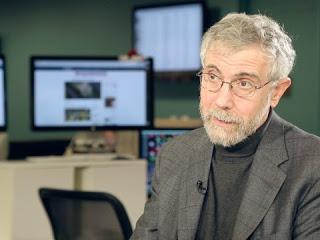 It is obvious that the U.S. economy continues to struggle, and has done so since the latter part of 2007. The rich (and the corporations) have fully recovered from the Bush recession, but few other Americans have. Unemployment can't get below about 5%, leaving millions still out of work, wages are stagnant (with almost all rising productivity going to management), and the GDP remains below normal.
It is obvious that the U.S. economy continues to struggle, and has done so since the latter part of 2007. The rich (and the corporations) have fully recovered from the Bush recession, but few other Americans have. Unemployment can't get below about 5%, leaving millions still out of work, wages are stagnant (with almost all rising productivity going to management), and the GDP remains below normal.The Republican prescription for fixing this is to maintain (and double-down) "trickle-down" economics. Just give more money to the rich (and corporations) and everything will be OK. There are a couple of problems with that. First, the rich and corporations already have more profits and more money in the back (and hidden offshore) than ever before -- and none of it is trickling down (in the form of jobs or new investment).
Second, it is this "trickle-down" economics (instituted during the Reagan administration) that started our financial problems in the first place (and culminating in the Bush recession and current struggles). Continuing this failed economic theory won't solve our economic woes -- it will just make them worse. That's why the Republicans MUST be voted out of power in November.
So, how can the economy be fixed? Nobel Prize-winning economist Paul Krugman says we need to start by reversing the growth of monopolies in the U.S. He says these monopolies (encouraged by "trickle-down" economics) inhibit both job creation and economic growth -- and he makes a good case for that. Here is how he describes it in his April 18th New York Times column:
In recent years many economists, including people like Larry Summers and yours truly, have come to the conclusion that growing monopoly power is a big problem for the U.S. economy — and not just because it raises profits at the expense of wages. Verizon-type stories, in which lack of competition reduces the incentive to invest, may contribute to persistent economic weakness. The argument begins with a seeming paradox about overall corporate behavior. You see, profits are at near-record highs, thanks to a substantial decline in the percentage of G.D.P. going to workers. You might think that these high profits imply high rates of return to investment. But corporations themselves clearly don’t see it that way: their investment in plant, equipment, and technology (as opposed to mergers and acquisitions) hasn’t taken off, even though they can raise money, whether by issuing bonds or by selling stocks, more cheaply than ever before. How can this paradox be resolved? Well, suppose that those high corporate profits don’t represent returns on investment, but instead mainly reflect growing monopoly power. In that case many corporations would be in the position I just described: able to milk their businesses for cash, but with little reason to spend money on expanding capacity or improving service. The result would be what we see: an economy with high profits but low investment, even in the face of very low interest rates and high stock prices. And such an economy wouldn’t just be one in which workers don’t share the benefits of rising productivity; it would also tend to have trouble achieving or sustaining full employment. Why? Because when investment is weak despite low interest rates, the Federal Reserve will too often find its efforts to fight recessions coming up short. So lack of competition can contribute to “secular stagnation” — that awkwardly-named but serious condition in which an economy tends to be depressed much or even most of the time, feeling prosperous only when spending is boosted by unsustainable asset or credit bubbles. If that sounds to you like the story of the U.S. economy since the 1990s, join the club. There are, then, good reasons to believe that reduced competition and increased monopoly power are very bad for the economy. But do we have direct evidence that such a decline in competition has actually happened? Yes, say a number of recent studies, including one just released by the White House. For example, in many industries the combined market share of the top four firms, a traditional measure used in many antitrust studies, has gone up over time. The obvious next question is why competition has declined. The answer can be summed up in two words: Ronald Reagan. For Reagan didn’t just cut taxes and deregulate banks; his administration also turned sharply away from the longstanding U.S. tradition of reining in companies that become too dominant in their industries. A new doctrine, emphasizing the supposed efficiency gains from corporate consolidation, led to what those who have studied the issue often describe as the virtual end of antitrust enforcement. True, there was a limited revival of anti-monopoly efforts during the Clinton years, but these went away again under George W. Bush. The result was an economy with far too much concentration of economic power. And the Obama administration — preoccupied with the aftermath of financial crisis and the struggle with bitterly hostile Republicans — has only recently been in a position to grapple with competition policy. Still, better late than never. On Friday the White House issued an executive orderdirecting federal agencies to use whatever authority they have to “promote competition.” What this means in practice isn’t clear, at least to me. But it may mark a turning point in governing philosophy, which could have large consequences if Democrats hold the presidency. For we aren’t just living in a second Gilded Age, we’re also living in a second robber baron era. And only one party seems bothered by either of those observations. (The picture above of Paul Krugman is from the Business Insider.)

